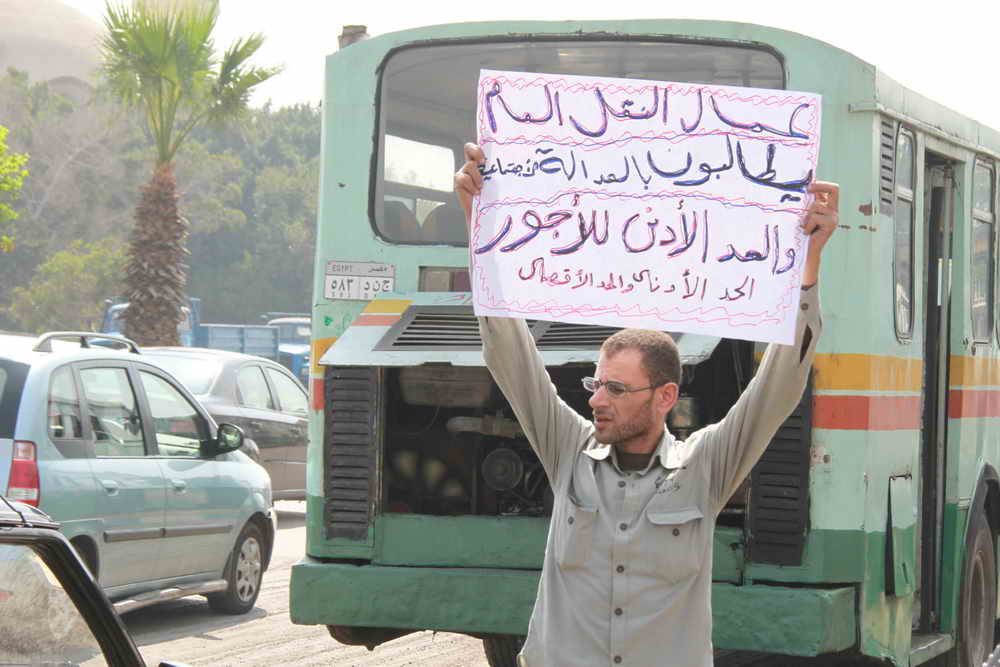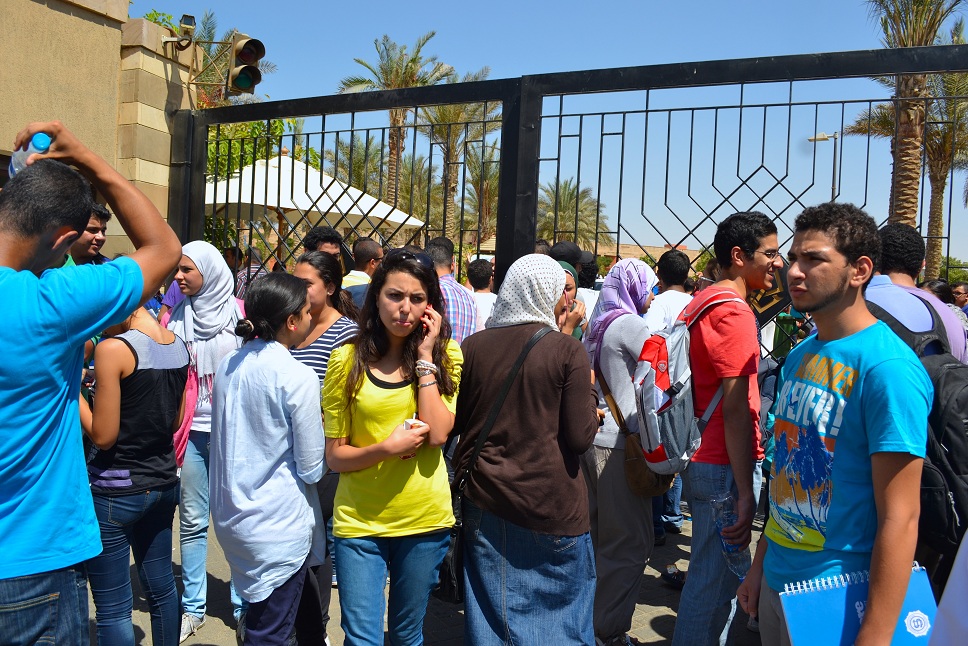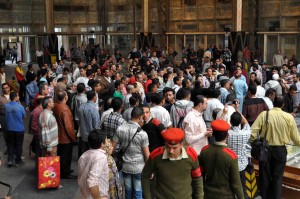
(Photo by: Mohamed Omar )
On Sunday 7 April, train drivers began a nationwide strike throughout Egypt resulting in the closures of major railway stations. The train drivers who organised the strike raised technical and financial demands. They called for real and regular maintenance to be carried out on the locomotives, passenger carriages, freight wagons and railway lines. They also demanded financial rights; issuing meal allowance, increasing the value of bonus pay for each kilometre they drive a train from 11 piasters to 25 piasters (the smallest form of currency exchanged in Egypt), and paying insurance and pension arrears.
“Before we were not always vocal about our rights because we lacked awareness,” says Ashraf Momtaz, a senior train driver.
Momtaz was among the drivers leading the strike. He wants the corruption inside the Egyptian Railway Authority (ERA) to be revealed. “There is a huge discrepancy in the way resources are allocated inside ERA. We see millions spent on the buildings and offices of the Ministry of Transportation and ERA. Yet when it comes to giving workers and drivers their rights, officials complain about budget deficits.”
The strike continued into the third day before it was called off. During this time negotiations took place between ERA and train drivers.
“The immediate response of ERA was to give a 10 percent raise for everyone,” says Momtaz.
Momtaz explains that originally the strike was not planned in advance, it was rather a spontaneous reaction to how the ERA mishandled the demands of the drivers. The situation exacerbated when the striking drivers received a letter summoning them to a regimental depot for military service.
“The addressee would be subject to six months in jail or a fine worth EGP 500, or both, unless he is present at the regiment tomorrow,” read the summons letter sent to Momtaz.
When Momtaz and his colleagues went to the regiment the next day, they learned there was an order to conscript them into the army.
“They wanted us to work as train drivers at the military, which is something we all refused. If we were to accept being under the supervision of the military, the smallest mistakes we do could lead us to military trials. We refused to be stripped of our civilian jobs and become conscripts while 99% of us already surpassed the legal age for conscription,” says Momtaz.
Later on the drivers learnt that the decision to conscript them was issued by the Central Agency for Public Mobilisation and Statistics (CAPMAS) and supported by the Armed Forces. This was an unconventional way to deal with a worker’s strike. The procedure was deemed illegal by Khaled Ali, lawyer and director of the Egyptian Centre for Economic and Social Rights, because it wrongfully used Law 87, which only allows the state to call for immediate conscription when the country is preparing for war or facing a natural disaster. Additionally, this decision needs to be taken by the president and not an institution such as CAPMAS or even the Armed Forces.
“We arrived at the regiment at 8am on 9April, we held a sit-in until the next day around 3pm waiting for the order to be cancelled. At the end, they went back on the decision calling for conscription,” he says proudly.
Momtaz explains that right now the train drivers are giving ERA’s administration a chance to fulfil the many promises they gave about addressing the demands the drivers have raised.
“So far they promised to form a committee to restructure and evaluate wages. The maintenance issue was not addressed and up until now the committee hasn’t been formed,” Momtaz says. “We will wait one month before we take action.”
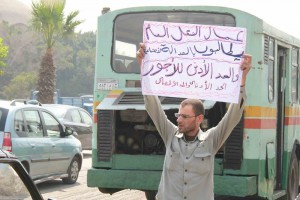
(Photo by: Mohamed Omar)
Security repression
There is no doubt that the labour movement assisted in bringing down Honsi Mubarak’s regime. Many workers were at the forefront of the 25 January uprising, some held strikes at their factories while others joined in mass demonstrations at Tahrir Square.
The Egyptian Federation of Independent Trade Unions (EFITU) was born out of the revolution, the first real structure representing the interests of the workers. EFITU announced its formation at Tahrir five days after the uprising broke out. It was created to challenge the state-controlled Egyptian Trade Union Federation (ETUF) which claimed a monopoly over the representation of workers during the Mubarak era.
Before the revolution, the labour movement struggled with organising itself due to the constant security repression. The biggest incident where this repression was manifested is the Mahalla strike in 2008 where security forces intervened violently to end a strike.
Under the new post-revolutionary regime the repression against the labour movement persists. The railway strike is just one example of how the security apparatus is still seeking to repress the labour movement. Many other incidents have occurred during the past few months.
Dalia Moussa is the coordinator of labour communications at the Egyptian Centre for Economic and Social Rights. She cites the incident of Portland Cement factory at Alexandria where workers organised a strike, but the police unleashed dogs on them in an attempt to disperse the strike. The attack left 150 workers injured and led to the arrest of 18 others.
Moussa explains that there is an informal alliance forged between Egyptian businessmen and the police. “When workers strike or hold a sit-in, the police protect businessmen and deal with workers violently. Security intervention is always the first thing that pops into the heads of the government of the Ministry of Manpower. We’ve seen the police’s brutal intervention in a myriad of other protests and now with the case of the railway strike the military became involved too,” says Moussa.
Fatma Ramadan is an executive board member of the EFITU. She explains why this crackdown on the labour movement is happening.
“Currently there are two big issues looming in the labour movement. First is the state’s attempt to break the movement and the second is the struggle of the movement to organise and unionise. The movement is at a critical point reflecting the status of the country, because the movement does not operate in a vacuum. When the revolutionaries and those who call for the demands of the 25th January uprising are strong, the labour movement is enhanced,” says Ramadan.
According to Ramadan, the EFITU has received reports from its member syndicates over the past year and half. These reports show a number of syndicates have closed down and about 400 leaders of strikes and sit-in have faced arbitrary procedures by either being dismissed from their work or arrested, interrogated and jailed. This number is unprecedented even when compared to the repression of worker’s movements under the Mubarak regime.
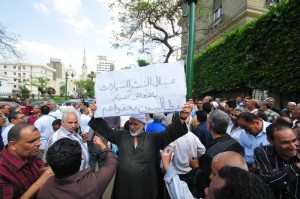
(Photo by: Hassan Ibrahim)
Conflicting interests
“The momentum of the labour movement fluctuates with the status of political life. When workers are active their demands come at the core of political activism,” says Moussa.
According to state-owned Al-Ahram, the International Development Centre reported in its democracy indicator, that during March of 2013, protests took place in Egypt numbered 1,345. Some of them were for political, economic or security reasons. About 283 were organised by workers; 142 protests demanding raises and arrears, 73 demanding fixed-contracts, 44 protesting against arbitrary dismissal and 11 protesting against corruption and nepotism.
From these figures it becomes clear that despite the sometimes violent reaction to strikes, workers are continuing to take action. Moussa affirms that workers will not give up on protesting unless different economic policies are adopted.
“The economic policies embraced before and after the revolution align with the interests of businessmen and investors, therefore you find that most actions and procedures taken against workers are arbitrary and do not preserve their interests. The laws are passed to prioritise businessmen and facilitate investment conditions,” she explains.
Under the Mubarak regime there had been a marriage between politics and business. Businessmen such as Ahmed Ezz (a former member of the Egyptian parliament and a senior member of the National Democratic Party) were also political figures. Therefore, those owning companies and factories were the same ones legislating and passing the laws.
The heritage of the same economic policies is continuing under President Mohamed Morsi, whose government has close ties to businessmen such as Hassan Malek. The only difference is this time is that those businessmen are not in parliament, they are members of the Muslim Brotherhood.
“The workers demand the return of privatised companies to the public sector such as Tanta for Linen, Shibeen for spinning, and Omar Afandi and Nile Co. for cotton. Some of these companies already have court orders to be de-privatised, but the rulings have not yet been enforced,” says Ramadan.
Another crucial demand is minimum wage. The current minimum wage for workers in one month is EGP 700 gross, while EGP 300 of this salary is deducted for insurance. With the recent economic recession and the ever-rising inflation rate, workers are demanding a minimum wage the workers demand for has now reached EGP 1,500 gross.
The government justifies not implementing the minimum wage due to a lack of resources and the growing state budget deficit. “This justification is meaningless; the real reason is that the current government is following the footsteps of the Mubarak regime when it comes to economic policies, which made people oust him in the first place,” says Ramadan.
Arbitrary dismissal is another issue the workers have long fought against; witnessing its continuity is a bitter experience for many workers. While cases of arbitrary dismissal are commonly repeated with workers organising or leading strikes, workers with temporary contracts suffer from these dismissals as well.
This is why another demand of the movement is to amend the Labour Law of 2003. One of the provisions of the law stipulates that workers can be hired on temporary terms and can be dismissed upon the end of the contracts.
“The workers want social justice to prevail. This is a core demand of the revolution. Also, they have recently raised the slogan of ‘fighting corruption’ when they realised that no real improvement will happen without cleansing institutions,” says Ramadan.
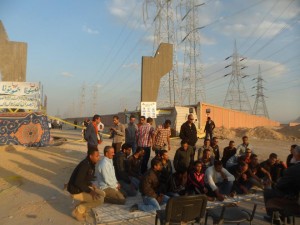
(Photo by: Amr Ghonema)
Tailoring the law
According to Ramadan, there is a ubiquitous hostility against the labour movement which is manifested in different ways.
“There was a media campaign that shamed the workers and labelled their demands as merely ‘categorical’, claiming the workers were manipulating the revolution for their personal gains. When this campaign failed to end labour strikes and sit-ins, we started seeing laws criminalising these acts of labour protests,” she says.
Ramadan is referring to Decree 34 passed by the Supreme Council of Armed Forces (SCAF) in 2011 which criminalised sit-ins and strikes with the threat of fines reaching EGP 50,000.
Ramadan says that now the Muslim Brotherhood plan to draft another law criminalising strikes and denying workers any means of dissent. “This is sheer stupidity because Mubarak had an arsenal of laws, yet workers continued striking. It is the strikes and sit-ins of the workers that paved the way for the revolution to take place and these labour movements will only continue the revolution. That’s why the regime’s plans are weaved to keep the movement at bay.”
In Novemnber 2012, President Morsi approved an amendment to Trade Union law 35, which stipulated that the ETUF’s term is extended and allowed for appointing new members of the union’s board, replacing members who were above 60 years old.
“With this amendment the government has controlled the top of the pyramid through controlling ETUF. They are now seeking to control the next level; the member syndicates,” explains Ramadan.
Even though EFITU is now two years old, it still did not manage to attract the membership of all syndicates; as a result the majority of syndicates are still members of the regime-era ETUF. As a result, access to ETUF means access to the majority of syndicates.
“Currently the law of labour syndicates is being discussed and drafted behind closed doors, even though we’ve worked on a previous draft when former prime minister Essam Sharaf was in office. The current draft that we own from our last meeting with Minister of Manpower Khaled Al-Azhari is turning syndicates into the same bureaucratic model of the ETUF. This will make syndicates less free,” Ramadan comments.
Article 62 of the draft is controversial and confirms that the current government seeks to break the momentum of the labour movement. The article stipulates that the prosecutor general has the right to dissolve any syndicate if its decisions called for “leaving work or inciting and encouraging refraining from work intentionally, especially if this work contributes to providing public services or facilities”. In other words, if the syndicate encourages strikes then its administrative board could be dissolved.
Despite this bleak outlook, many workers are still voicing their demands. Tomorrow on Labour Day worker’s organisations are holding marches and conferences through their independent syndicates and the EFITU. They demand to be free to join syndicates or not and for their syndicates to have the same freedom to join the EFITU or not. They advocate for freedom to organise and the cancellation of laws criminalising their activism; strikes and sit-ins. The future of labour relations in Egypt may not have arrived just yet, but a return to the past is impossible.
